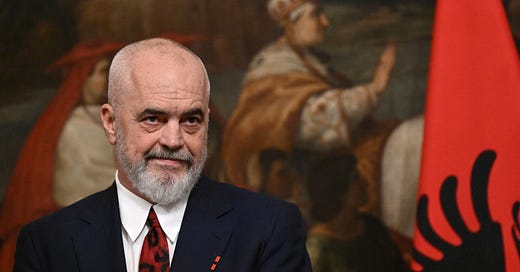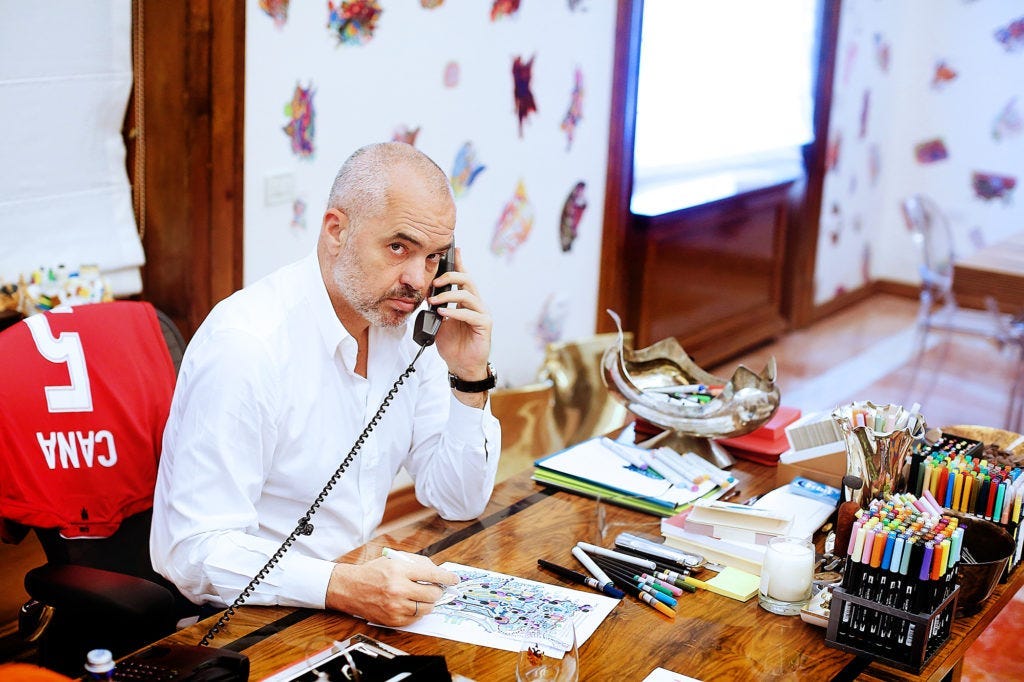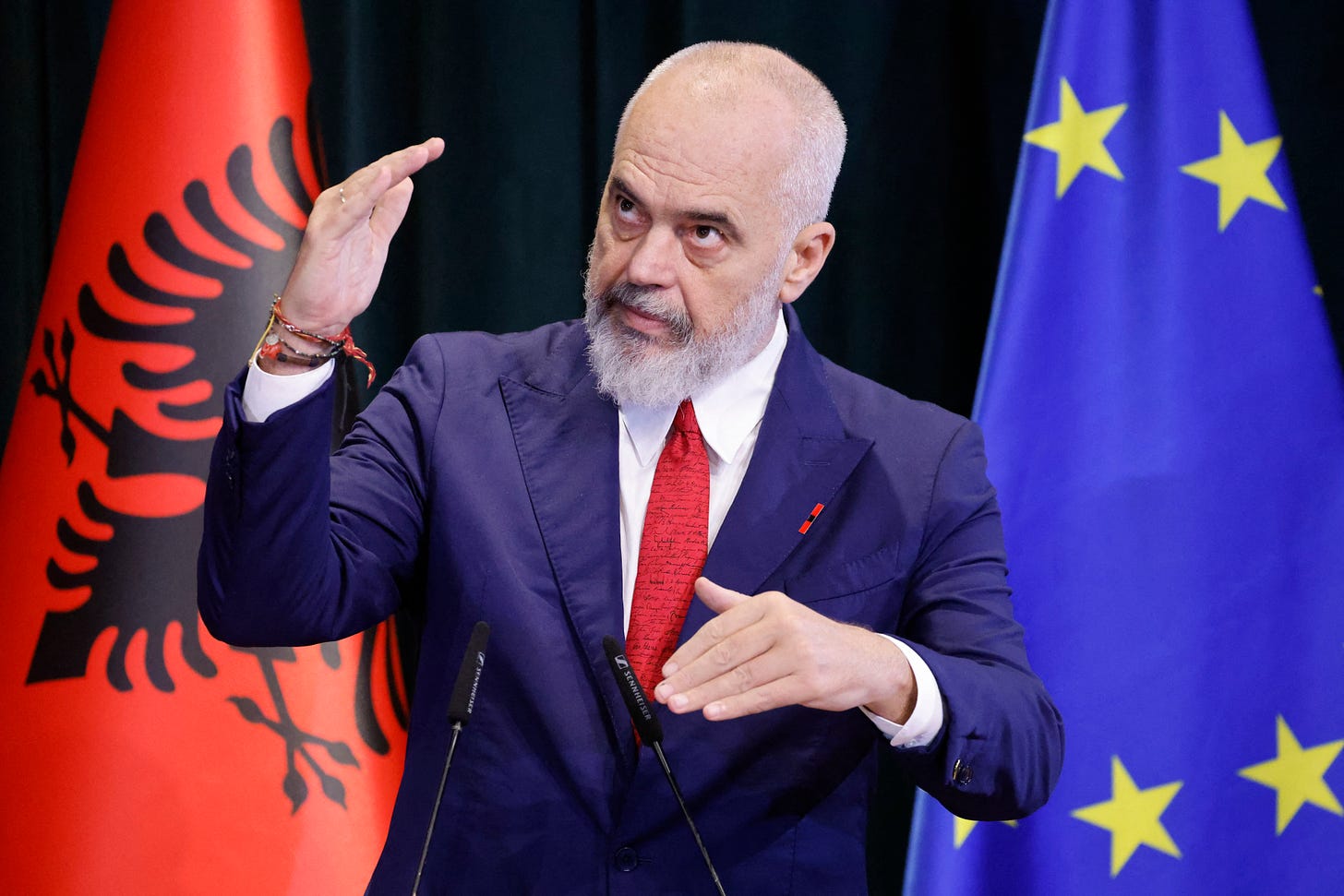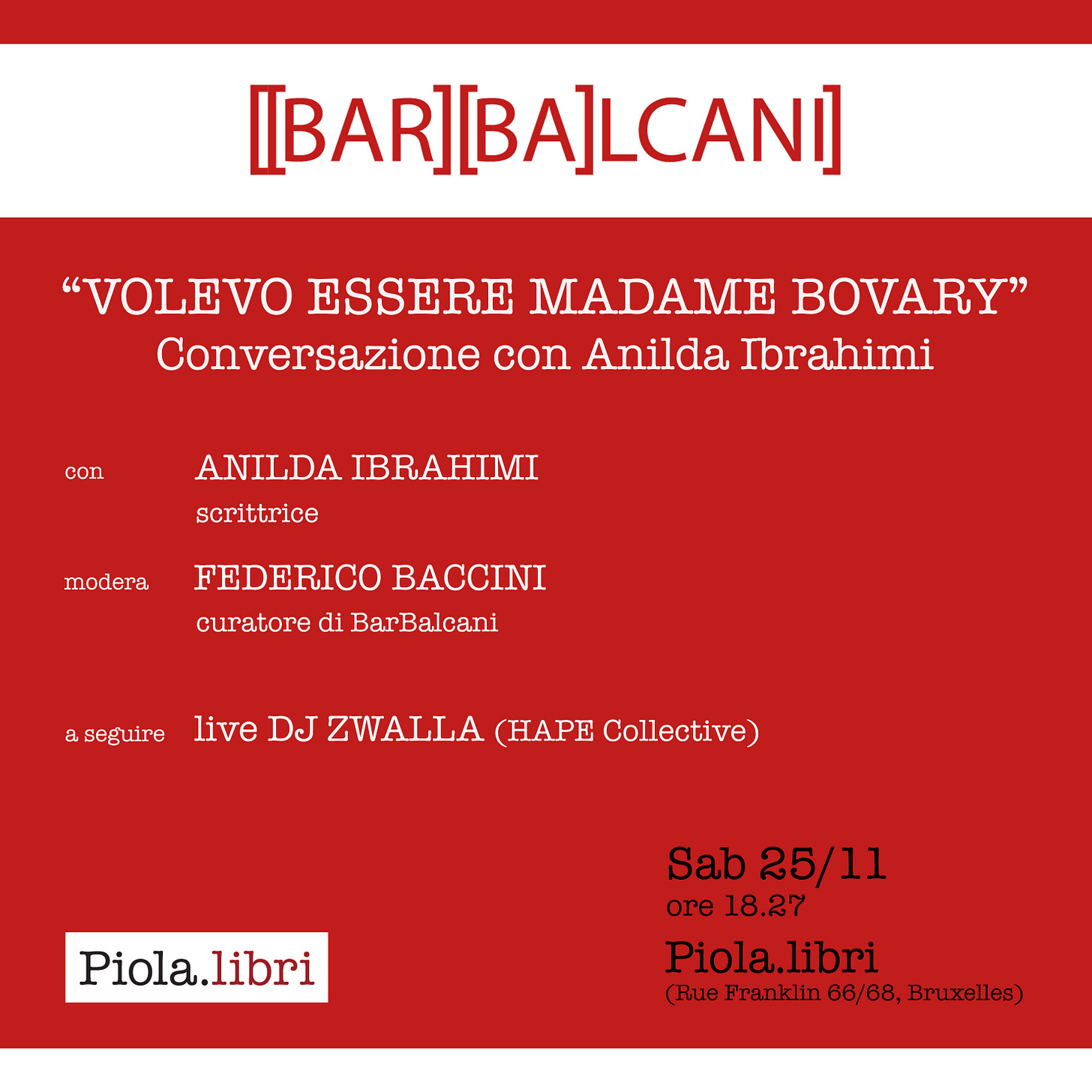S4E7. Can we really trust Edi Rama?
The Prime Minister of Albania attracted great interest for a controversial deal with the Italian government. While he is often admired abroad, he reveals his true nature within national borders
Hi,
welcome back to BarBalkans, the newsletter (and website) with blurred boundaries.
There are times when, from the shadows that usually surround the whole region, the interest for the Balkan countries from the European public opinion sparks almost unexpectedly.
A video, a statement, a political episode. It takes little to create a momentary wave of interest, which ends up bursting like a soap bubble.
Recently, this happened to Albania.
The socialist Prime Minister, Edi Rama, recently signed a controversial migration deal with the Italian far-right government led by Giorgia Meloni. This created great curiosity about the Albanian leader and his unconventional loquacity. A politician so different from the other ‘plastered’ European leaders.
Some admire his pragmatism, others criticize his opportunism. But Rama is generally well-liked in Brussels for his Europeanism.
It is clear that his diplomatic strategy is to accredit himself as the driving force behind the integration of Albania and the Western Balkans into the EU, from the international summits in Tirana to the deal with Italy on one of the most controversial issues in European politics. However, we need to urgently answer some pressing questions.
Who is Edi Rama and what does he really want?
And, most importantly, to what extent can we trust a leader governing one of the most backward European countries for the respect of Rule of Law and press freedom?
Who is Edi Rama
Edvin Kristaq Rama has been the Prime Minister of Albania since 2013. As a teenager, he was involved in sports as a basketball player for Dinamo Tirana. But later on, he tried to distinguish himself in the field of arts.
He graduated at the Tirana University of Arts and he was a professor there for a few years. He participated in demonstrations for democracy after the fall of the communist regime, before moving to France to seek his fortune as a painter at the age of 30.
Back in Tirana in 1998, he became Minister of Culture, Youth and Sports in the government led by the Socialist Party. In the following two years, Rama became well-known for a disruptive political style and very colorful clothing, with self-designed patterned ties.
Edvin (Edi since 2002) Rama built his national political credibility in the next 11 years. As an independent candidate supported by leftist parties, in 2000 he was elected Mayor of Tirana (reelected in 2003 and 2007).
During his three terms until 2011, hundreds of illegal buildings in the center of the capital were demolished, the facades of buildings built under the communist regime were repainted and the Tirana Master Plan was drafted with plans for the renovation of Skanderbeg Square (the central square).
After joining the Socialist Party in 2003, two years later he became (and still is) chairman. In 2013, Rama triumphed his first national election at the head of the leftist coalition, defeating the right-wing coalition led by Prime Minister Sali Berisha’s Democratic Party.
His platform ‘Renaissance’ was based on four pillars: European integration, economic revitalisation, restoration of the public order and democratisation of the State institutions.
For the past 10 years, Rama has been the Prime Minister of Albania. Under his leadership, the country has strengthened law enforcement authorities, approved judicial and liberal economic reforms and, most of all, tightened relations with regional and other European countries.
He led Albania into a new era, after the very harsh Enver Hoxha’s communist regime, the chaos of the Nineties and the political conflict of the early 2000s. But he has also reinterpreted and brought to a new level the role of a political strongman.
The artist of the new European Albania
For years, the plan has been to create the brand of a developing and big-hearted Albania, as shown by some emblematic episodes of his premiership.
In 2015, just after the Charlie Hebdo attack, Rama traveled to Paris with colored pencils in his pocket. An artist and leader of a Muslim-majority country attended a progressive march in defense of press freedom.
In 2018, he offered to host 20 migrant people stuck off the Italian coast on the ‘Diciotti’ Coast Guard ship, because of the decision of Minister of Interior, Matteo Salvini. This was an apparent message of solidarity on migration - five years ago and again today - which came to nothing. None of those 20 people ever arrived to Albania (and it could not be otherwise according to the EU law).
In 2020, at the beginning of the COVID-19 pandemic, he sent a medical team in support to Italy. However, those 30 professionals were totally unprepared for Italian intensive caren departments, because the true nature of that mission was different. It was a propaganda operation for Italian and European public opinion.
Read also: S2E10. The Western Balkan Union
Since then, this strategy has only grown stronger and intertwined with the urgent needs of EU enlargement. Starting from relations with other candidates (or potential candidates) in the Balkan region.
First of all, Rama has tightened relations with North Macedonia and Serbia through the ‘Open Balkan’ initiative, an economic and political cooperation project aimed to create a free trade area with the four guarantees of the Schengen area: free movement of people, goods, services and capital.
Meanwhile, he has intensified discussions with the President of Serbia, Aleksandar Vučić, considering the common interests on the path to the EU. As well as with the Prime Minister of Kosovo, Albin Kurti, trying to become a mediator in the complex relations between Prishtina and Belgrade.
The Albanian Prime Minister’s diplomatic visits in recent years to Skopje, Podgorica, Sarajevo, Belgrade and Prishtina no longer count.
Rama has become to the EU what fixers are to foreign journalists in war zones. He knows the political and social environment, he suggests stories to be told, he provides an interpretation of the situation. His comments and guidance are trusted.
Read also: S3E17. Fill the glass, Open Balkan(s)
It is no coincidence that the two ‘first ever’ events for the European Union and the region were hosted in Tirana, and not in other Balkan capitals.
On 6 December 2022, the first ever EU-Western Balkans Summit hosted in the region. And on 16 October 2023, the first ever Berlin Process Leaders’ Summit hosted outside the EU territory.
EU leaders are always smiling and less formal, when they are with Rama. He is “allowed” to surprise them (for example, with personalized plates he himself hand-painted), but also to harshly criticize them for broken promises (he recently compared the enlargement process to «a bride that never shows up to the wedding»).
The Albanian leader can adopt this behaviour because everyone knows that he is a fervent supporter of the process of joining the EU, both for Albania and the Western Balkans.
Under his premiership, Albania was granted EU candidate status (in 2014) and the accession negotiations started in 2022. Now, Rama wants to make his country the 28th EU Member State as soon as possible:
«Many challenges exist, but for those of us here representing Europe without the ‘U’ the most striking political challenge is a painful separation between the EU member states and the non-EU non members».
Read also: Breaking news from Tirana
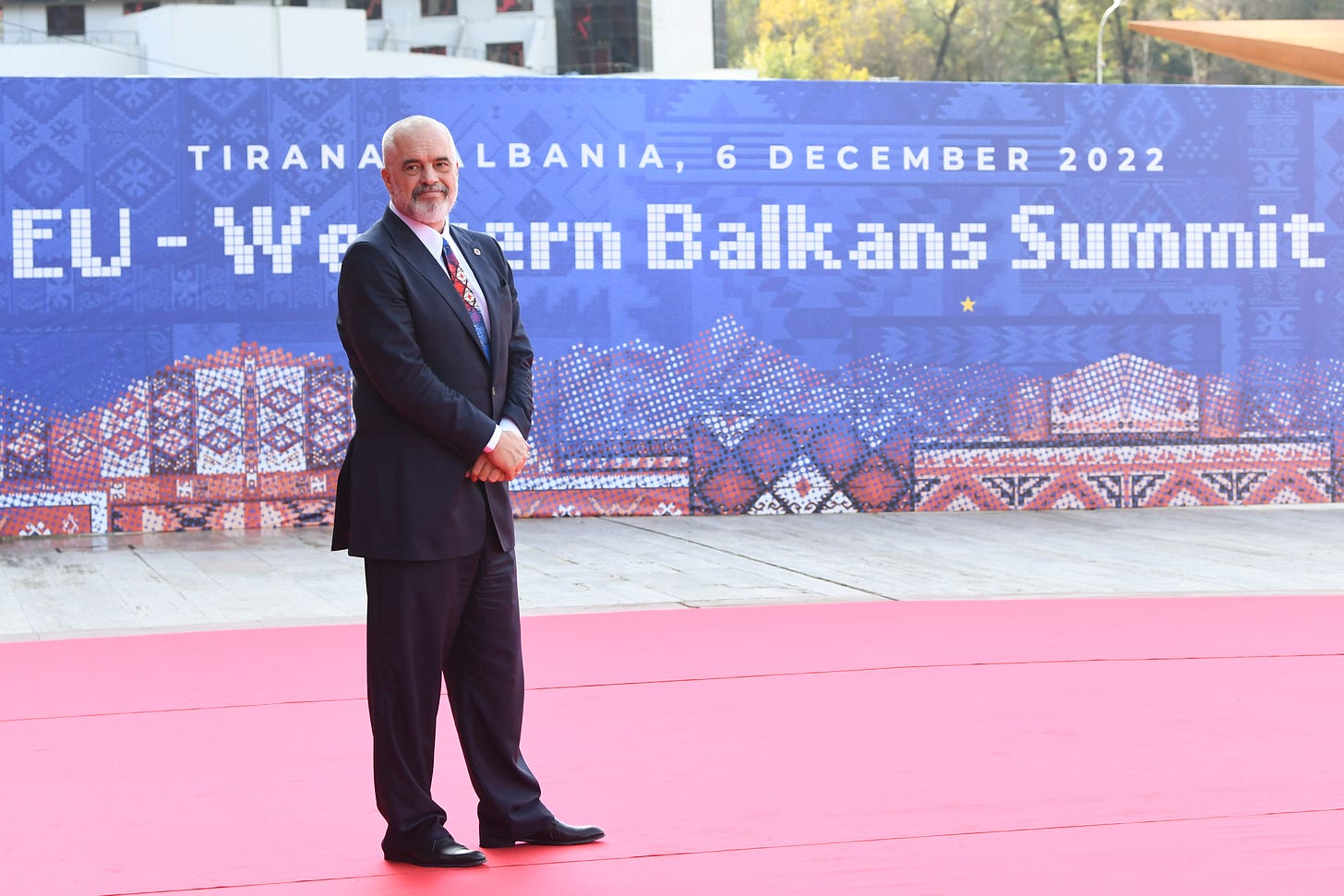
Once again, Rama tries to bridge this separation with the rhetoric of the “big-hearted” Albania, led by a pragmatic leader who does not care for ideological differences and offers solutions that the rest of Europe cannot find.
«We will not be ready for any request, just as we were not for similar requests before Italy asked us. But we could not say no to Rome, because we have a debt of gratitude that we will never be able to repay, but that we must never forget».
This is how Rama presented the controversial deal on migration with the Italian Prime Minister Meloni - a socialist together with a far-right politician.
This deal will be almost impossible to be grounded because of legal, practical and juridical issues (you can find them here). In particular, because it allegedly entails the transfer of sovereignty on two centers for landing, identification and repatriation procedures built on Albanian territory but under Italian jurisdiction.
However, all this is of no interest to Rama. «It will be up to the Italian government to prove that the deal works, since it will be responsible for all the administration», he pointed out after signing the Memorandum of Understanding.
In words and intentions, he wanted to show that he can help Italy much more than other EU Member States. On the contrary, the responsibility on the practical level is certainly not useful to his political and propaganda message.
The key elements are the image he is creating, the construction of his character and the idea of a new European Albania. Once the spotlight is off, he can play the opposite.
This is why we have to ask ourselves why Edi Rama is doing all this. Can we really trust him?
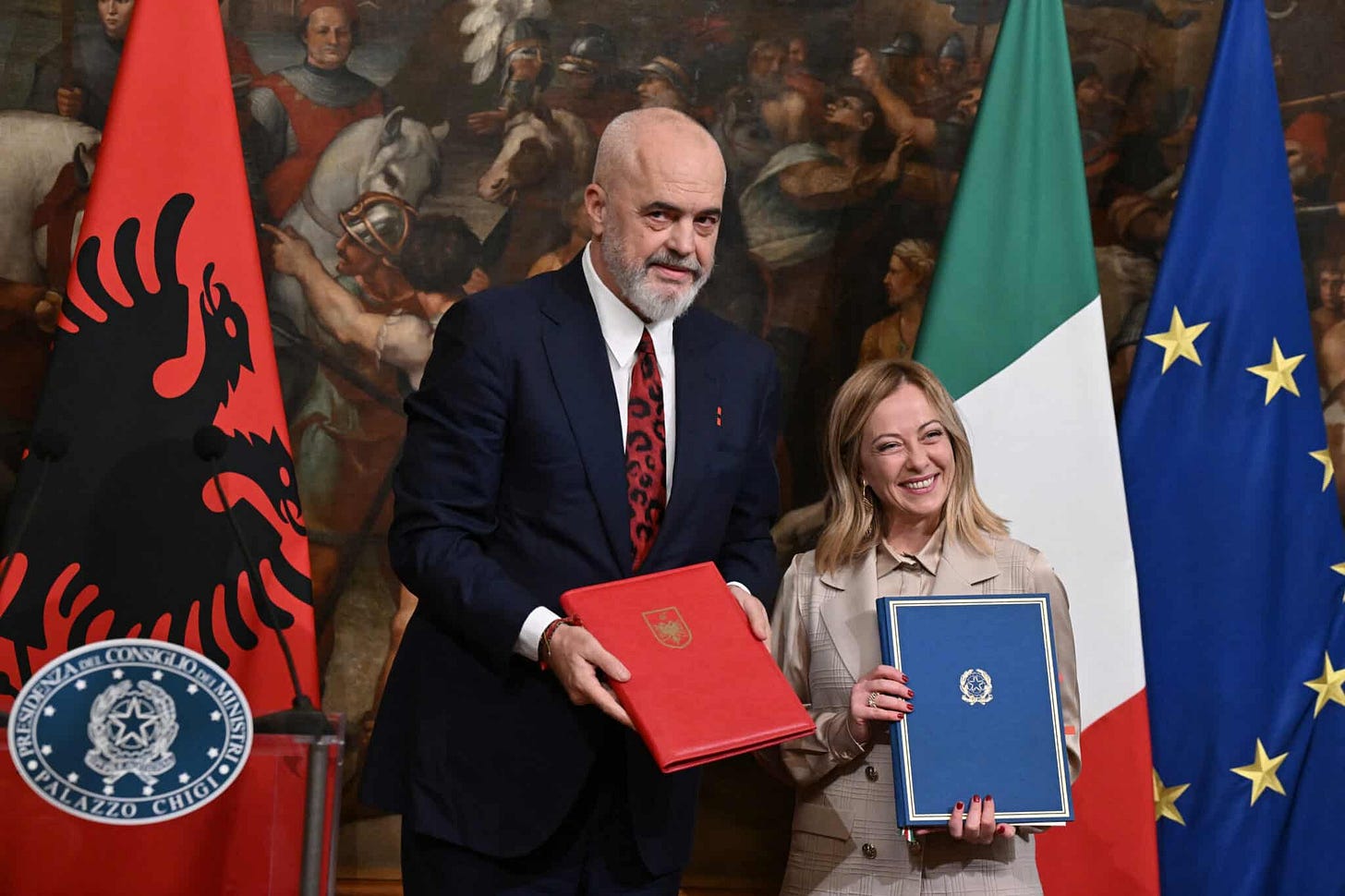
The king of the stabilocrats
Edi Rama behaves in this way because he is a stabilocrat. Not an autocrat, this is quite different. We are talking about a more fluid concept, not totally in contrast with the democratic exercise of power. And that closely concerns EU interlocutors.
As sociologist Chiara Milan explained to BarBalkans, authorities in Brussels relies on stabilocrats «because they promise reforms and a commitment to join the European Union, but internally they rule through cronyism and corruption and do not guarantee real freedom of expression».
This is a very Balkan category of politicians: it includes the President of Serbia, Aleksandar Vučić, and the former President of Montenegro, Milo Đukanović. But Albanian Prime Minister Rama is perhaps the most successful version.
Because no one in the region is known for being such a supporter of the united Europe. And thanks to the image of himself he is creating abroad, he is able to make people forget that the country he has been ruling for 10 years is one the most backward on the continent concerning corruption and press freedom.
Read also: Breaking news from Tirana
Let’s start with corruption, relying on two sources. The first one is the European Commission’s assessment drafted in the specific Albania report of the Enlargement Package 2023:
«Despite some progress and continued efforts in fighting corruption, it remains an area of serious concern. Overall, corruption is prevalent in many areas of public and business life and preventive measures continue to have a limited impact, particularly in vulnerable sectors».
The second source provides a comprehensive overview of the situation over time. According to the World Justice Project index, Albania is ranked 91st (out of 142 countries) for respecting the Rule of Law. From 0 (weak) to 1 (strong), Albania scores 0.48 in 2023. The global average is 0.55, the ‘Eastern Europe and Central Asia’ region average is 0.50.
Not considering Russia and Belarus for obvious reasons, Albania is the last European country on a par with Serbia in 2023. The deterioration has been steady since 2015, when Tirana was ranked 53rd with a score of 0.52.
The negative results in the areas of ‘constraints on government power’ (ranked 107th) and ‘absence of corruption’ (108th) are significant, with compliance with the Rule of Law severely falling short of the global average.
If this is not alarming enough, we can consider the level of press freedom. According to the latest Reporters Sans Frontières index, Albania is ranked 96th (out of 180 countries).
Despite the fact that Albania is the second-last European country (only Greece is worse, without considering Russia and Belarus) in 2023, there has been an increase of 6 positions compared to 2013. However, the global scenario has worsened - more than in Albania - and not the respect for press freedom in the country improved.
Comparing the data, we can underline a clear erosion of the freedom. From 0 (weak) to 100 (strong), the 102nd place in 2013 corresponded to 69.12, while the 96th place in 2023 corresponds to 57.86.
«Journalists are victims of organized crime and, at times, police violence, spurred on by the government’s failure to protect them», the report notes. «Journalists critical of the government are often subjected to political attacks designed to discredit them, and they have trouble accessing state-held information».
In 2013, Rama inherited not the best shaped Albania. In ten years, he has made it even worse on the level of Rule of Law.
This is where we can find his unspoken demands. To the European Union, to turn a blind eye to the general situation in the country, in exchange for almost unconditional pro-European rhetoric. And to Italy, to help Tirana silence the most critical voices in Brussels, in exchange for almost unlimited solidarity (in words).
This is what Edi Rama really wants.
It is time to get to know him, if we really want to trust him.
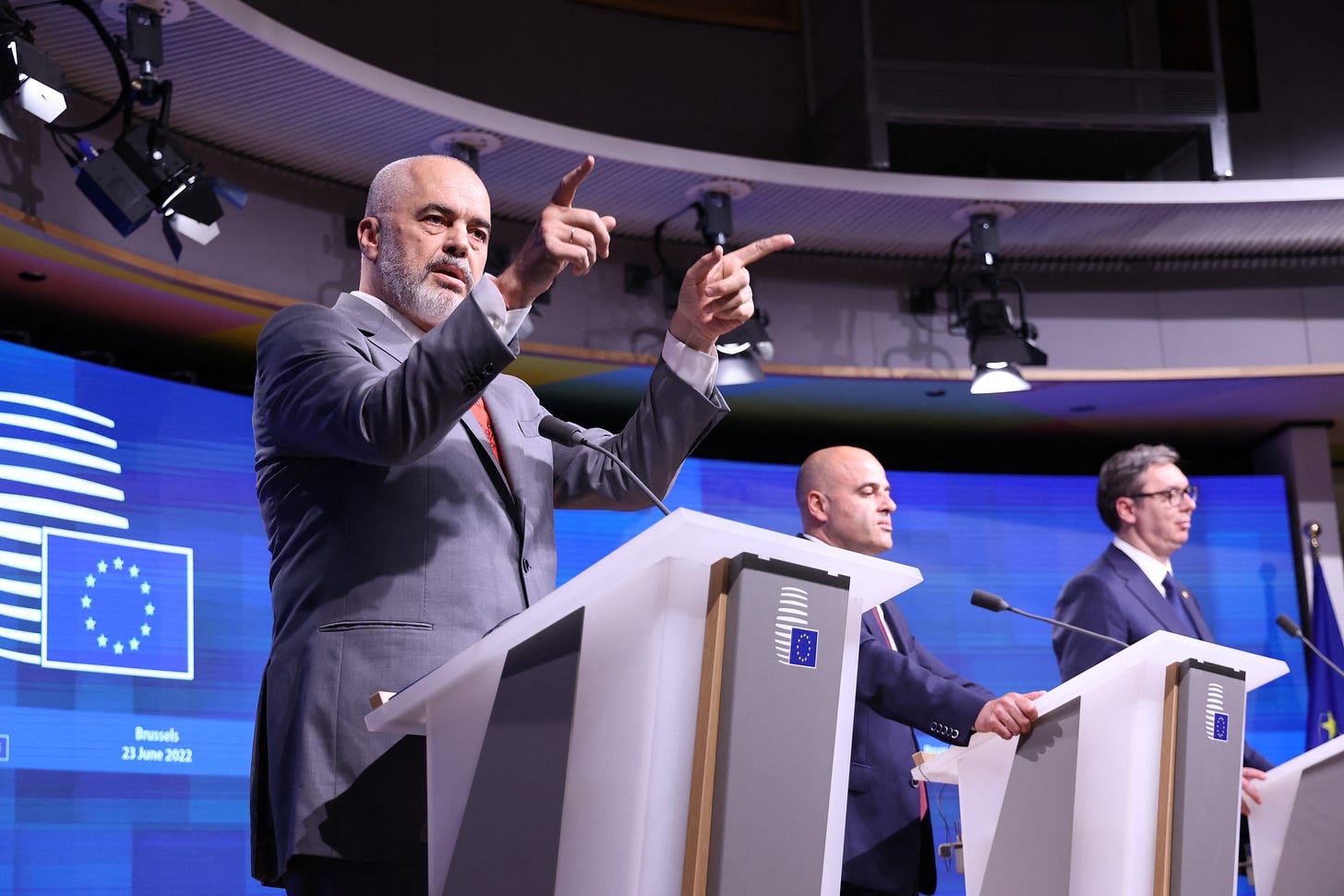
Pit stop. Sittin’ at the BarBalkans
We have reached the end of this piece of road.
When we deal with Albania and Europe, there is much more than the Prime Minister Rama to talk about.
This is why today at our bar, the BarBalkans, we want to mention an important event for this project and for the efforts to create meaningful moments for reflection.
On Saturday 25 November, in Brussels, the Italian bookstore and wine shop PiolaLibri will host BarBalkans’ new event (for those who understands Italian) “Volevo essere Madame Bovary. Dialogo con Anilda Ibrahimi”.
It will be an opportunity to meet the Albanian writer deeply rooted in Italy and author of Italian novels focused on the history, culture and society of Albania over the last century.
Her latest novel, Volevo essere Madame Bovary, will be the starting point for our dialogue with the special guest who opened the fourth season of this newsletter.
Precisely in this novel, Ibrahimi has left a clue about Prime Minister Rama in Tirana:
“In the background, the colorful buildings painted by the former artist mayor, who felt the urge to cover the gray of communism with bright colors a few years ago. It was called by Western newspapers a desire for beauty as a need to break with the past”.
The conversation will be followed by a live dj set by DJ Zwalla (HAPE Collective).
Read also: S4E1. Anilda Ibrahimi. Overcoming limits
Click here to read more:
Let’s continue BarBalkans journey. We will meet again in two weeks, for the 8th stop of this season.
A big hug and have a good journey!
If you have a proposal for a Balkan-themed article, interview or report, please send it to redazione@barbalcani.eu. External original contributions will be published every last Friday of the month in BarBalkans - Open bar section.
Your support is essential to realize all that you have read. And to keep BarBalkans newsletter free for everyone.
An independent project like this cannot survive without the support of the readers. For this reason I kindly ask you to consider the possibility of donating:
Every second Wednesday of the month you will receive a monthly article-podcast on the Yugoslav Wars, to find out what was happening in the Balkans - right in that month - 30 years ago.
You can listen to the preview of BarBalkans - Podcast on Spreaker and Spotify.

